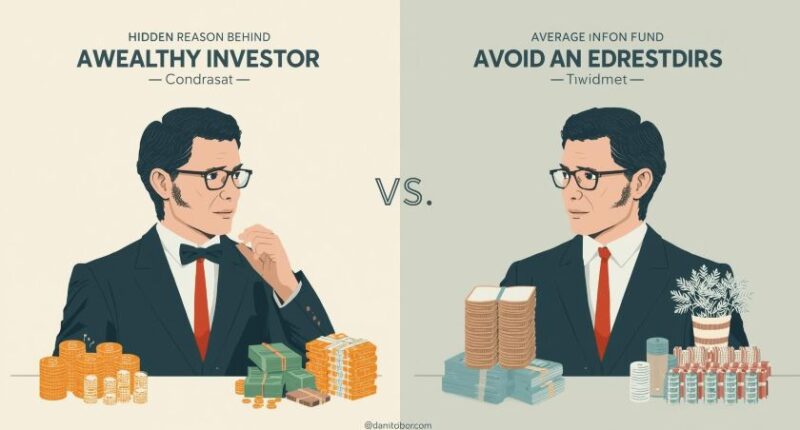Index funds have long been promoted as one of the best tools for long-term wealth building. They’re simple, low-cost, and provide instant diversification. For most investors, they’re a smart, no-stress way to grow money over time.
But here’s the surprising truth: many wealthy individuals and institutional investors avoid index funds altogether. Instead, they pursue other strategies that often outperform the market or provide benefits index funds can’t offer.
In this article, we’ll uncover why rich people avoid index funds, what they invest in instead, and how their mindset toward risk, control, and opportunity sets them apart from the average investor.
Understanding Index Funds and Why They’re Popular
What Is an Index Fund?
An index fund is a type of investment that tracks a market index like the S&P 500 or NASDAQ 100. Instead of picking individual stocks, it automatically invests in every company within that index.
-
Pros: Low fees, automatic diversification, and historically strong long-term returns.
-
Cons: No flexibility, no control, and limited potential for outperformance.
For average investors, index funds remove emotional decision-making and make investing easy. But for the wealthy, that simplicity is also the problem.
The Hidden Reason the Rich Avoid Index Funds
1. They Want Control, Not Passivity
Rich investors didn’t build their wealth by following the crowd. Index funds are passive — meaning investors simply follow the market’s performance.
Wealthy investors prefer control:
-
They want to choose specific sectors or companies.
-
They use private equity, hedge funds, or direct ownership to influence outcomes.
-
They often seek asymmetric opportunities, where the upside is massive compared to the risk.
In short, the rich don’t want to own the market — they want to beat it.
2. They Have Access to Exclusive Investments
The wealthy have opportunities that the average investor doesn’t. Many of their investments exist outside the stock market.
Examples include:
-
Private equity and venture capital — investing in early-stage startups before IPOs.
-
Real estate funds and commercial properties — generating steady cash flow and appreciation.
-
Hedge funds — managed by professionals using complex strategies to hedge risks and seek high returns.
These private markets often outperform public markets, but they require high capital and accreditation — barriers that keep most investors out.
3. Tax Efficiency and Customized Strategies
High-net-worth investors pay careful attention to tax management, often structuring their portfolios to minimize capital gains and income taxes.
Index funds, while tax-efficient for average investors, can still trigger taxable events when the fund rebalances or distributes dividends.
The wealthy, on the other hand, use:
-
Tax-loss harvesting
-
Municipal bonds
-
Private placement life insurance (PPLI)
-
Offshore structures
These help them retain more wealth after taxes — something index funds can’t optimize individually.
4. The Rich Focus on Cash Flow, Not Just Growth
While index fund investors focus on market growth, wealthy investors prioritize cash flow — consistent income regardless of market conditions.
Examples include:
-
Real estate rental income
-
Private business ownership
-
Dividend-paying stocks
-
Debt and lending funds
This allows the rich to remain financially independent, even during market downturns.
5. Index Funds Limit Upside Potential
The average index fund tracks market performance — meaning investors can only earn as much as the market allows.
Wealthy investors, however, seek unlimited upside through alternative assets.
For instance:
-
A single real estate deal could return 10x profits.
-
A startup investment could yield a 100x exit.
-
Leveraged investments can multiply gains faster than market averages.
While risky, these opportunities offer exponential growth that index funds cannot match.
The Rich Investor’s Mindset: Think Like a Business Owner
Active vs. Passive Wealth Building
The key difference between rich and average investors isn’t access — it’s mindset.
-
Average investors think like employees saving for retirement.
-
Rich investors think like owners creating long-term wealth engines.
They use their capital to build systems that generate money — not just hold onto assets that grow slowly over decades.
Example: Owning vs. Investing
Instead of owning shares in Apple through an index fund, a rich investor might:
-
Fund a new tech startup.
-
Invest in a supplier that serves Apple.
-
Buy a commercial property rented to tech companies.
This approach gives them direct control and often a higher return on investment.
What the Rich Invest In Instead of Index Funds
1. Private Equity
The rich invest in private companies before they go public. By getting in early, they capture massive value growth during IPOs or acquisitions.
2. Real Estate
Commercial and multi-family real estate provide passive income, tax deductions, and appreciation — all in one asset class.
3. Hedge Funds
These funds use sophisticated trading strategies, derivatives, and short-selling to generate profits regardless of market direction.
4. Venture Capital
Investing in early-stage startups can yield extraordinary returns — though success rates are low, one big win can outweigh multiple losses.
5. Businesses and Franchises
Many wealthy individuals buy or invest in operating businesses that produce ongoing cash flow.
6. Collectibles and Alternative Assets
Art, luxury watches, wine, or even digital assets (NFTs) serve as alternative investments that hedge against inflation and diversify portfolios.
Can the Average Investor Learn from the Wealthy?
Absolutely. While most people can’t access hedge funds or private deals, they can adopt the same principles:
-
Focus on long-term ownership, not short-term trading.
-
Diversify beyond index funds — include real estate, side businesses, or ETFs targeting growth sectors.
-
Learn about tax optimization and compound growth.
-
Invest in knowledge — the best-performing asset of all.
The lesson isn’t to abandon index funds, but to understand their limitations and gradually expand your investment approach as your wealth grows.
Key Takeaways
-
Wealthy investors avoid index funds because they limit control and upside potential.
-
The rich focus on cash flow, tax efficiency, and private investments unavailable to average investors.
-
They treat money as a tool for ownership and influence, not just savings.
-
Average investors can emulate this mindset by diversifying, learning, and thinking long-term.
Conclusion
The gap between rich and average investors isn’t just money — it’s mindset, access, and strategy.
While index funds remain excellent tools for most people, they are often too passive for the wealthy, who seek greater control, unique opportunities, and exponential returns.
The wealthy don’t invest to “match the market.” They invest to create their own market advantage — and that’s the real secret behind their financial success.









